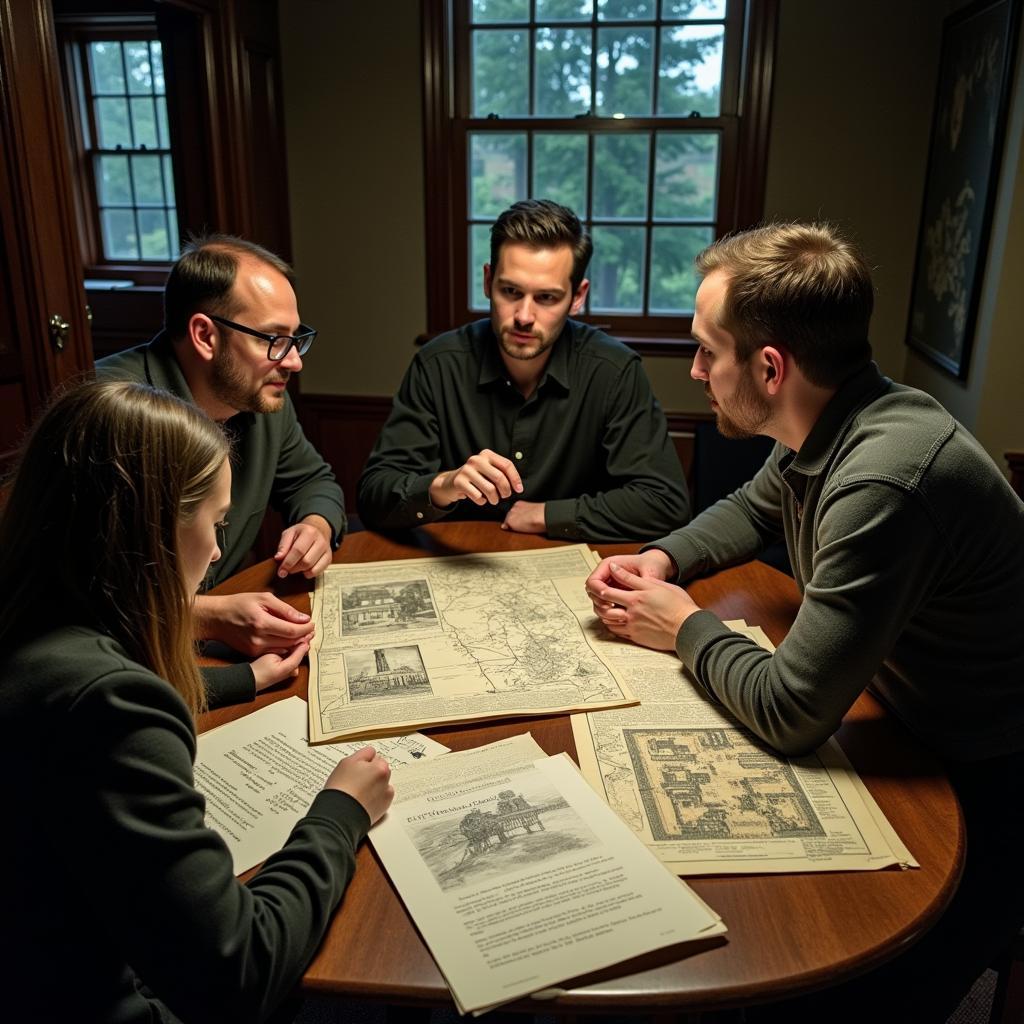Exploratory Research Seeks To understand a phenomenon in its initial stages. It’s like stepping into uncharted territory, armed with curiosity and a desire to map the unknown. Often used when the subject is poorly understood, this type of research lays the groundwork for more in-depth studies. Its value lies not in providing definitive answers but in uncovering the right questions. From the mundane to the paranormal, exploratory research seeks to illuminate the shadows of our understanding.
Understanding the Purpose of Exploratory Research
What does exploratory research seek to achieve? It’s not about proving a hypothesis; it’s about forming one. It’s about exploring the unknown, understanding the nuances of a phenomenon, and laying the foundation for future research. Think of it as the initial reconnaissance mission before a full-scale investigation. It allows researchers to gain familiarity with a topic, identify key variables, and develop working hypotheses that can be tested later through more structured research methods. This initial exploration is crucial in fields like paranormal research where established knowledge is often limited and anecdotal evidence abounds. It helps us differentiate between genuine anomalies and mere misinterpretations of natural phenomena. Here at Paranormal Research, we utilize exploratory research to navigate the complexities of the unexplained. We look at historical accounts, witness testimonials, and physical evidence to gain a preliminary understanding of the phenomenon in question. This process helps us formulate relevant research questions and determine the most appropriate methodologies for further investigation. Check out our resources on exploratory descriptive and causal research.
How Exploratory Research Seeks to Uncover the Unknown
Exploratory research seeks to uncover the unknown by embracing flexible and iterative methodologies. Unlike quantitative research, which focuses on numerical data and statistical analysis, exploratory research utilizes qualitative methods like interviews, case studies, and observations. This allows for a deeper understanding of the context and meaning behind the phenomenon under investigation. In paranormal investigations, for example, conducting interviews with witnesses is crucial in gathering firsthand accounts and understanding the emotional impact of the experience. This information, while subjective, can provide valuable insights into the nature of the phenomenon and guide the direction of further research.
Exploratory Research Seeks To: Define Research Questions
Exploratory research seeks to define research questions by first understanding the landscape of the existing knowledge. It begins with a broad exploration of the subject, gathering information from various sources. This may include reviewing literature, conducting informal interviews, or analyzing existing data. Through this process, patterns and gaps in knowledge begin to emerge, leading to the formulation of specific research questions that can guide further investigation. For instance, in researching a supposed haunted location, exploratory research might involve reviewing historical records, local folklore, and interviewing residents. This initial investigation helps shape the research questions, focusing perhaps on specific periods of activity, types of reported phenomena, or environmental factors that might contribute to the experiences. Learn more about formulating research questions with our research question examples.
Why Defining Research Questions Is Crucial in Exploratory Research
Defining research questions is crucial in exploratory research as it provides direction and focus for the investigation. Without clear research questions, the exploration can become aimless and unproductive. Well-defined research questions allow researchers to narrow their focus, identify the most relevant data to collect, and develop appropriate methodologies for analysis. In the context of paranormal research, clear research questions help distinguish between genuine anomalies and mundane explanations. For example, a research question might focus on specific electromagnetic fluctuations during reported paranormal activity, allowing investigators to gather targeted data and analyze it for potential correlations.
 Defining Research Questions in Paranormal Studies
Defining Research Questions in Paranormal Studies
Exploratory Research: Pure vs. Applied
Exploratory research seeks to expand our understanding, whether it’s for the sake of knowledge itself (pure research) or for solving a specific problem (applied research). Understanding the distinction between applied vs pure research is vital. While both can utilize exploratory methods, their ultimate goals differ. Pure research in the paranormal might investigate the nature of consciousness and its potential relationship to reported apparitions, while applied research might focus on developing methods for mitigating the perceived negative effects of a haunting.
The Role of Exploratory Research in Different Research Types
Exploratory research plays a significant role in various research types. From understanding the different 12 types of research to the specific challenges faced by marketers as detailed in our article on in setting research objectives marketers have to, the principles of exploratory research remain consistent. It provides the initial foundation upon which more structured and targeted research can be built. In paranormal research, exploratory studies can pave the way for experimental designs that test specific hypotheses about paranormal phenomena, allowing for a more rigorous and scientific approach to understanding the unexplained.
In conclusion, exploratory research seeks to illuminate the unknown, laying the groundwork for future investigation. It is a crucial first step in understanding complex phenomena, particularly in fields like paranormal research where established knowledge is often limited. By embracing flexible methodologies and focusing on defining research questions, exploratory research helps us navigate the mysteries of the unexplained and pave the way for a deeper understanding of the world around us.
FAQ
- What is the main goal of exploratory research?
- How does exploratory research differ from other research methods?
- What are some common methods used in exploratory research?
- Why is defining research questions important in exploratory research?
- Can exploratory research be used in both pure and applied research?
- How does exploratory research contribute to paranormal investigations?
- What are some examples of exploratory research in the paranormal field?
Need help with your Paranormal Research? Contact us 24/7! Phone: 0904826292, Email: research@gmail.com or visit us at No. 31, Alley 142/7, P. Phú Viên, Bồ Đề, Long Biên, Hà Nội, Việt Nam.